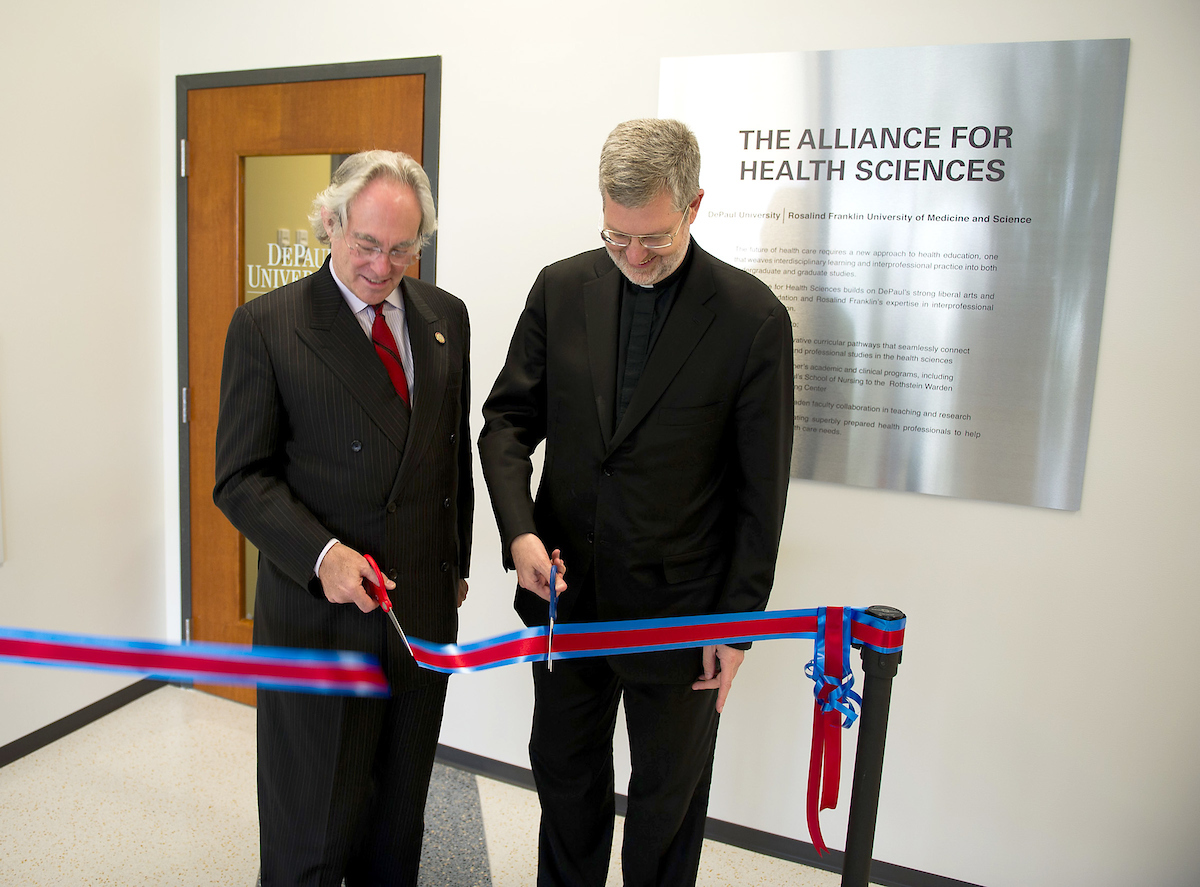 Dr. K. Michael Welch from Rosalind Franklin University of Medicine and Science and Rev. Dennis H. Holtschneider, C.M., from DePaul at the ribbon cutting ceremony celebrating the Alliance for Health Sciences. DePaul has formed many strategic collaborations in recent years to strengthen the quality of education for our students. (Photo courtesy of Rosalind Franklin University of Medicine and Science)
Dr. K. Michael Welch from Rosalind Franklin University of Medicine and Science and Rev. Dennis H. Holtschneider, C.M., from DePaul at the ribbon cutting ceremony celebrating the Alliance for Health Sciences. DePaul has formed many strategic collaborations in recent years to strengthen the quality of education for our students. (Photo courtesy of Rosalind Franklin University of Medicine and Science)As technology continues to change our world quicker than you can blink your eye, so do the industries and priorities of the workforce DePaul graduates are entering.
With an unyielding commitment to student success and education, DePaul has addressed these changes by evaluating industries of growth and adding relevant programs and collaborations. Building new programs from scratch can be costly, but strategic alliances with established companies, other higher education institutions and the city of Chicago have proven to be successful.
"When universities are challenged to build new or better programs, collaborations make a lot of sense," says the Rev. Dennis H. Holtschneider, C.M., president of DePaul. "In each of these cases, the alliance benefits both parties."
Smart collaborations add value to student degrees by giving them real-world experiences they may not otherwise have access to at DePaul. Furthermore, alliances with third parties often include joint research by faculty or collaboration with executive managers at multiple institutions and organizations. These collaborations not only elevate the reputation of the entities involved, many inevitably strengthen ties to the community. Most important, however, is what students learn through these collaborations and the many professional opportunities they offer.
Here is a look at some of DePaul's recent alliances:
- The university established a strategic alliance with Rosalind Franklin University of Medicine and Science to provide pathways for DePaul students to complete professional degree programs at Rosalind Franklin; expand and strengthen academic programs at both schools; foster collaboration between faculties of the two institutions; and create additional research opportunities for students.
- DePaul and Rush University Medical Center have a history of working together on initiatives ranging from research projects to a joint degree program. In February 2014, DePaul and Rush formalized a five-year collaboration to plan and coordinate new programs to benefit students in the field of health care.
- Cinespace Chicago Film Studio provides students with film and television production experience in a large scale working studio. Cinespace currently has the largest soundstage in the United States outside of Los Angeles. The studio hosted the filming of Divergent, Transformers 3 & 4, Chicago Fire, Crisis and Chicago PD.
- The City of Chicago, Metropolitan Pier and Exposition Authority (MPEA) and DePaul are working together on an economic development project to build an arena and events center in Chicago. The project is part of the city's tourism and neighborhood revitalization initiative. In addition to hosting home games for DePaul men's and women's basketball teams, the events center will support other high-profile functions, including DePaul graduation ceremonies and Chicago's convention-related business.
- Designed to support the Universal Church, DePaul and the Catholic Theological Union have an educational alliance, involving faculty exchanges, co-sponsored educational events and scholarship support.
- In an effort to address the critical global issue of homelessness, DePaul is collaborating with Depaul International, a London-based charity, to establish the Institute for Global Homelessness. The research center will be one of the first academic establishments of its kind to provide training, services and best practices for working with the homeless worldwide.
- DePaul has collaborated with Chicago Public Schools on many different occasions to adopt schools, offer mentorship, collaborate with faculty and conduct studies. The most recent example includes a five-year study on preventing violence among urban African-American youth by teaching ninth-graders how to cope with stress and avoid aggression.
- DePaul collaborates with Facing History and Ourselves to help educators develop tools to address complex social issues. The collaboration raises awareness among educators and the public about the need to teach social justice.
- DePaul and the Chicago History Museum have an educational alliance that gives students the opportunity to gain free admission.
- More than 2,000 DePaul students completed academic internships in the 2013-14 academic year. From public relations to finance, the university relies on the many businesses, nonprofit and government organizations in Chicago to provide students with invaluable opportunities.
These collaborations represent some of DePaul's current strategic alliances. They enrich the industries they touch and add value to student degrees while keeping costs down.
"Each of these strategic alliances enhances the quality of our students' education and ensures that DePaul is responsive to Chicago's future workforce," Holtschneider says.
Looking forward, the workforce will always call for change, and DePaul will continue to answer.